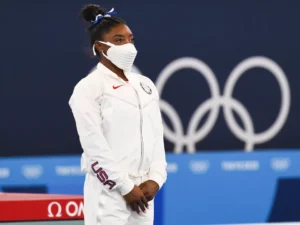These worries had already started creeping when COVID-19 hit and safety protocols limited her to only spending time at the gym or at home. But they intensified as the dates for Tokyo approached. “My mind was racing and I wasn’t going to sleep as easily,” she said.
Biles famously withdrew from several events at the Tokyo 2020 Olympics and advocated the importance of athletes taking care of their mental health alongside their physical health. Biles said she had every intention of performing when she arrived in Tokyo and shrugged off critics who called her a quitter. “If I were going to quit, I had other opportunities to quit,” she said. For example, she continued to compete even while she faced depression and suicidal thoughts after realizing she’d been one of the hundreds who were sexually assaulted by Larry Nassar, team doctor for the women’s national gymnastics team for nearly two decades. (Nassar plead guilty to several counts of the sexual assault of minors in 2018, among other charges.) “There is so much I’ve gone through in this sport, and I should have quit over all that—not at the Olympics,” Biles said. “It makes no sense.”
What ultimately made Biles back out of several of her planned 2020 competitions was a case of the “twisties,” a condition where an athlete’s mind and body feel disconnected, resulting in a loss of muscle memory and spatial awareness mid-air, as SELF previously reported. Biles was in the middle of her vault performance in the women’s team final when the condition made her fail to fully complete her planned twists and stumble on the landing.
